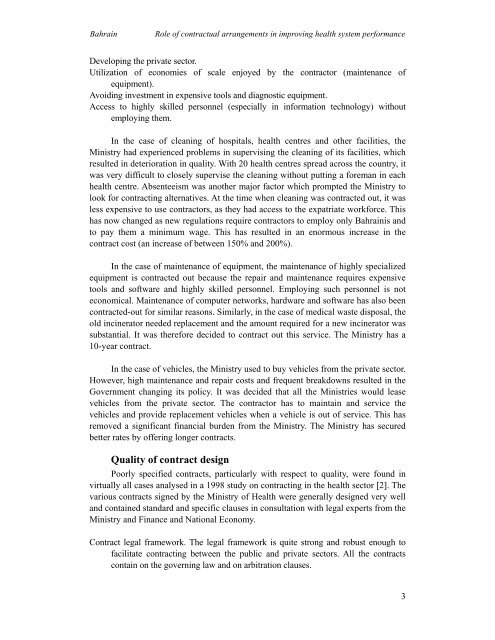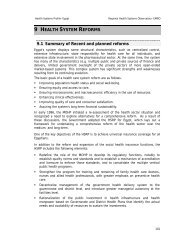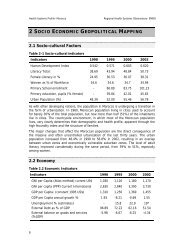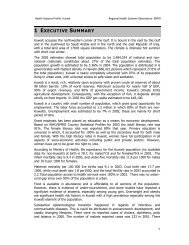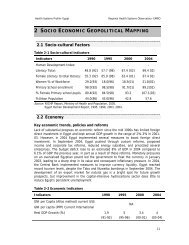Bahrain - What is GIS
Bahrain - What is GIS
Bahrain - What is GIS
Create successful ePaper yourself
Turn your PDF publications into a flip-book with our unique Google optimized e-Paper software.
<strong>Bahrain</strong> Role of contractual arrangements in improving health system performance<br />
Developing the private sector.<br />
Utilization of economies of scale enjoyed by the contractor (maintenance of<br />
equipment).<br />
Avoiding investment in expensive tools and diagnostic equipment.<br />
Access to highly skilled personnel (especially in information technology) without<br />
employing them.<br />
In the case of cleaning of hospitals, health centres and other facilities, the<br />
Min<strong>is</strong>try had experienced problems in superv<strong>is</strong>ing the cleaning of its facilities, which<br />
resulted in deterioration in quality. With 20 health centres spread across the country, it<br />
was very difficult to closely superv<strong>is</strong>e the cleaning without putting a foreman in each<br />
health centre. Absentee<strong>is</strong>m was another major factor which prompted the Min<strong>is</strong>try to<br />
look for contracting alternatives. At the time when cleaning was contracted out, it was<br />
less expensive to use contractors, as they had access to the expatriate workforce. Th<strong>is</strong><br />
has now changed as new regulations require contractors to employ only <strong>Bahrain</strong><strong>is</strong> and<br />
to pay them a minimum wage. Th<strong>is</strong> has resulted in an enormous increase in the<br />
contract cost (an increase of between 150% and 200%).<br />
In the case of maintenance of equipment, the maintenance of highly specialized<br />
equipment <strong>is</strong> contracted out because the repair and maintenance requires expensive<br />
tools and software and highly skilled personnel. Employing such personnel <strong>is</strong> not<br />
economical. Maintenance of computer networks, hardware and software has also been<br />
contracted-out for similar reasons. Similarly, in the case of medical waste d<strong>is</strong>posal, the<br />
old incinerator needed replacement and the amount required for a new incinerator was<br />
substantial. It was therefore decided to contract out th<strong>is</strong> service. The Min<strong>is</strong>try has a<br />
10-year contract.<br />
In the case of vehicles, the Min<strong>is</strong>try used to buy vehicles from the private sector.<br />
However, high maintenance and repair costs and frequent breakdowns resulted in the<br />
Government changing its policy. It was decided that all the Min<strong>is</strong>tries would lease<br />
vehicles from the private sector. The contractor has to maintain and service the<br />
vehicles and provide replacement vehicles when a vehicle <strong>is</strong> out of service. Th<strong>is</strong> has<br />
removed a significant financial burden from the Min<strong>is</strong>try. The Min<strong>is</strong>try has secured<br />
better rates by offering longer contracts.<br />
Quality of contract design<br />
Poorly specified contracts, particularly with respect to quality, were found in<br />
virtually all cases analysed in a 1998 study on contracting in the health sector [2]. The<br />
various contracts signed by the Min<strong>is</strong>try of Health were generally designed very well<br />
and contained standard and specific clauses in consultation with legal experts from the<br />
Min<strong>is</strong>try and Finance and National Economy.<br />
Contract legal framework. The legal framework <strong>is</strong> quite strong and robust enough to<br />
facilitate contracting between the public and private sectors. All the contracts<br />
contain on the governing law and on arbitration clauses.<br />
3


